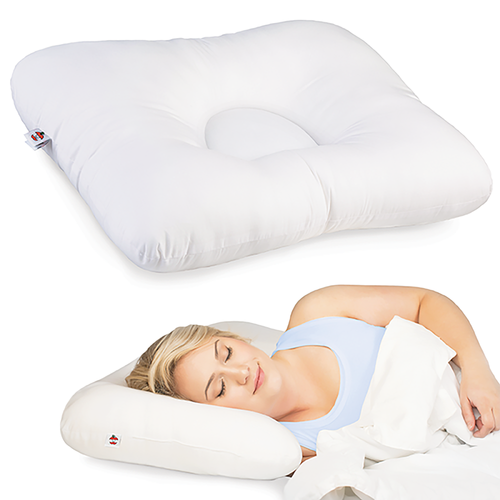

Four Reasons You Could Be Waking Up with a Sore Neck
Brian Acton
In an ideal world, sleep would be simple: you lay down, fall asleep immediately, get eight hours of rest and feel refreshed in the morning. But in the real world, there are many ways to “sleep wrong” which can lead to all sorts of issues, including neck pain and stiffness.
If you have recurring neck pain, stiffness, and soreness, there’s a good chance you aren’t sleeping in a way that properly supports your spine. Here are four reasons you could be waking up with a sore neck (and what to do about it).
1. Your Sleeping Position
Many people have one preferred sleeping position. If yours is on your stomach, you could be putting your neck in an awkward position for prolonged periods of time. Sleeping on your stomach can cause you to arch your back and twist your head to the side for hours, putting a strain on your neck muscles and causing stiffness in the morning.
2. Your Pillow
The right pillow will keep your spine in alignment, elevating your head and supporting your neck at just the right position. But a pillow that’s too thin or too thick will prevent proper spinal positioning, causing your muscles and spine to remain misaligned all night long.
3. Prior Injuries
Conditions like whiplash or sports injuries may not become immediately apparent, but they can manifest pain later. If you injured yourself but didn’t notice, you could go to bed feeling okay and wake up with a stiff, sore neck.
4. Sudden Movements
Sudden movements, like thrashing awake from a bad dream or rolling over, can strain or sprain your neck as you sleep. While the pain may resolve itself over time, sudden movements can cause some temporary discomfort.
Here are tips to help prevent or relieve neck pain.
- Get a better pillow. If your neck is often stiff or tense in the morning, you may need to try a better pillow. Cervical pillows are designed to promote proper spinal positioning and are available for all body sizes and types. If you want to experiment with the right pillow thickness for you, check out the Adjust-A-Loft Comfort Pillow, which lets you adjust how much support you need for your body type and sleeping position.
- Sleep in the right position. Back and/or side sleeping are generally better for your neck. If you’re a stomach sleeper, it might be time to change up the way you sleep.
- Stretch every day. Neck stretching and massage can help loosen tight and stiff muscles and relieve pain. Make sure to work daily neck stretches into your routine. Here’s a good breakdown of basic stretches for your neck.
- Hot or Cold Therapy. Applying cold temperatures to a neck injury can help reduce swelling. Applying hot temperatures to stiff muscles can help improve circulation, loosening and relaxing the muscles. Check out our line of hot and cold packs for pain relief.
Sources
https://www.health.harvard.edu/pain/say-good-night-to-neck-pain
https://www.mayoclinic.org/diseases-conditions/neck-pain/diagnosis-treatment/drc-20375587
https://www.spine-health.com/conditions/neck-pain/how-treat-stiff-neck-after-sleeping
Mentioned Products

Tri-Core Cervical Support Pillow

D-Core Cervical Support Pillow

Tri-Core Ultimate Cervical Pillow, Firm Support

Dual Comfort CorPak Hot & Cold Therapy Pack

Dual Comfort Pressure Point Cold Therapy Pack




